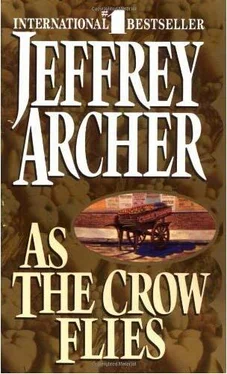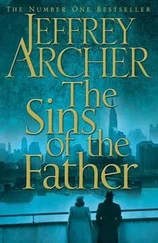"Are you certain?" began Birkenshaw, but this time it was Trentham who placed a hand firmly on his lawyer's arm.
"I will prove to your satisfaction, Mr. Baverstock," continued Trentham, "that the medal you now have in front of you could not have been the MC won by my brother."
"And just how do you propose to do that?" asked Baverstock.
"Because Guy's medal was unique. After he had been awarded his MC my mother sent the original to Spinks and at her request they engraved Guy's initials down the edge of one of the arms. Those initials can only be seen under a magnifying glass. I know, because the medal he was presented with on the Marne still stands on the mantelpiece of my home in Chester Square. If a miniature had ever existed my mother would have had his initials engraved on it in exactly the same way."
No one spoke as Baverstock opened a drawer in his desk and took out an ivory-handled magnifying glass that he nominally used to decipher illegible handwriting. He held up the medal to the light and studied the edges of the little silver arms one by one.
"You're quite right," admitted Baverstock, as he looked back up at Trentham. "Your case is proven." He passed both the medal and the magnifying glass over to Mr. Birkenshaw, who in turn studied the MC for some time before resuming the medal to Cathy with a slight bow of the head. He turned to his client and asked, "Were your brother's initials 'G.F.T.'?"
"Yes, that's right. Guy Francis Trentham."
"Then I can only wish that you had kept your mouth shut."
When Charlie burst into the drawing room that evening it was the first time that I really believed Guy Trentham was finally dead.
I sat in silence while my husband strode around the room recalling with relish every last detail of the confrontation that had taken place in Mr. Baverstock's office earlier that afternoon.
I have loved four men in my life with emotions ranging from adoration to devotion, but only Charlie encompassed the entire spectrum. Yet, even in his moment of triumph, I knew it would be left to me to take away from him the thing he most loved.
Within a fortnight of that fateful meeting, Nigel Trentham had agreed to part with his shares at the market price. Now that interest rates had risen to eight percent it was hardly surprising that he had little stomach for a protracted and bitter wrangle over any claim he might or might not have to the Hardcastle estate.
Mr. Baverstock, on behalf of the Trust, purchased all his stock at a cost of a little over seven million pounds. The old solicitor then advised Charlie that he should call a special board meeting as it was his duty to inform Companies House of what had taken place. He also warned Charlie that he must, within fourteen days, circulate all other shareholders with the details of the transaction.
It had been a long time since I'd looked forward to a board meeting with such anticipation.
Although I was among the first to take my place at the boardroom table that morning, every other director was present long before the meeting was scheduled to begin.
"Apologies for absence?" requested the chairman on the dot of ten.
"Nigel Trentham, Roger Gibbs and Hugh Folland," Jessica intoned in her best matter-of-fact voice.
"Thank you. Minutes of the last meeting," said Charlie. "Is it your wish that I should sign those minutes as a true record?"
I glanced round the faces at the boardroom table. Daphne, dressed in a perky yellow outfit, was doodling away all over her minutes. Tim Newman was looking as suave as ever and simply nodded, while Simon took a sip from the glass of water in front of him and when he caught my eye raised it in a mock toast. Ned Denning whispered something inaudible in Bob Makins' ear while Cathy placed a tick by item number two. Only Paul Merrick looked as if he wasn't enjoying the occasion. I turned my attention back to Charlie.
As no one appeared to be showing any dissent, Jessica folded back the last page of the minutes to allow Charlie to scrawl his signature below the bottom line. I noticed Charlie smile when he reread the final instruction the board had given him on the last occasion we had met: "Chairman to try and come to some amicable agreement with Mr. Nigel Trentham concerning the orderly takeover of Trumper's."
"Matters arising from the minutes?" Charlie asked. Still no one else spoke, so once again Charlie's eyes returned to the agenda. "Item number four, the future of—" he began, but then every one of us tried to speak at once.
When some semblance of order had been regained, Charlie suggested that it might be wise if the chief executive were to bring us up to date on the latest position. I joined the "Hear, hears" and nods that greeted this suggestion.
"Thank you, Chairman," said Arthur Selwyn, removing some papers from a briefcase by the side of his chair. The rest of the board waited patiently. "Members of the board will be aware that," he began, sounding like the senior civil servant he had once been, "following the announcement by Mr. Nigel Trentham that it was no longer his intention to mount a takeover bid for Trumper's, the company's shares subsequently fell from their peak of two pounds four shillings to their present price of one pound nineteen shillings."
"We're all capable of following the vagaries of the stock market," said Daphne, butting in. "What I would like to know is: what has happened to Trentham's personal shareholding?"
I didn't join in with the chorus of approval that followed as I already knew every last detail of the agreement.
"Mr. Trentham's stock," said Mr. Selwyn, continuing as if he had not been interrupted, "was, following an agreement reached between his lawyers and Miss Ross', acquired a fortnight ago by Mr. Baverstock on behalf of the Hardcastle Trust at a cost of two pounds one shilling per share."
"And will the rest of the board ever be privy to what brought about this cozy little arrangement?" asked Daphne.
"It has recently come to light," answered Selwyn, "that Mr. Trentham has, during the past year, been building up a considerable holding in the company on borrowed money, causing him to accumulate a large overdraft—an overdraft, I am given to understand, he can no longer sustain. With that in mind he has sold his personal holding in the company—some twenty-eight percent—direct to the Hardcastle Trust at the going market rate."
"Has he now?" said Daphne.
"Yes," said Charlie. "And it may also interest the board to know that during the past week I have received three letters of resignation, from Mr. Trentham, Mr. Folland and Mr. Gibbs, which I took the liberty of accepting on your behalf."
"That was indeed a liberty," said Daphne sharply.
"You feel we shouldn't have accepted their resignations?"
"I certainly do, Chairman."
"May one ask your reasons, Lady Wiltshire?"
"They're purely selfish, Mr. Chairman." I thought I detected a chuckle in her voice, as Daphne waited to be sure she had the full attention of the board. "You see, I'd been looking forward to proposing that all three of them should be sacked."
Few members of the board were able to keep a straight face at this suggestion.
"Not to be recorded in the minutes," said Charlie, turning towards Jessica. "Thank you, Mr. Selwyn, for an admirable summary of the present situation. Now, as I cannot believe there is anything to be gained by continuing to rake over those particular coals, let us move on to item number five, the banking hall."
Charlie sat back contentedly while Cathy reported to us that the new facility was making a respectable monthly return and she could see no reason why the figures should not continue to improve for the foresee able future. "In fact," she said, "I believe the time has come for Trumper's to offer its regular customers their own credit card as . . ."
Читать дальше












